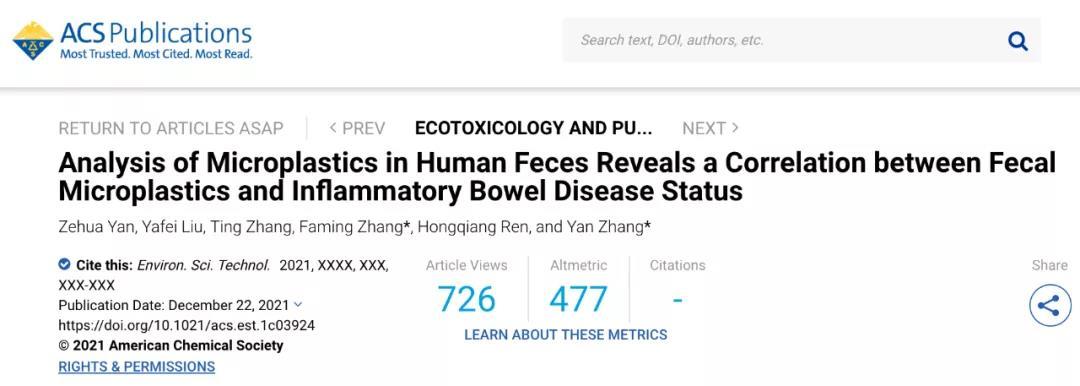News
Large Mounts Of Microplastics Detected In Stool Of Patients With Intestinal Disease

In 2018, a study by Dr. Philipp Schwabl from the University of Vienna showed that microplastics were found in human stool samples.
The study selected eight volunteers in European and Asian countries who reported in detail their diets for a week. Two volunteers chewed plastic-packed chewing gum every day, and many ingested fish and other seafood, most of whom drank bottled drinking water. In short, no one can escape the siege of plastic.
Microplastics were detected in stool samples from healthy volunteers, according to a study published online in <the Annals of Internal Medicine> in 2019. The researchers found that all stool samples tested positive for microplastics. There are an average of 20 microplastic particles per 10 grams of human feces. A total of nine plastics were detected, with polypropylene and polyethylene terephthalate having the highest levels.
This research shows that plastics end up in the human gut. This may not be good news for us. Even more worrying, microplastics are already ubiquitous.
Previously, researchers from Nankai University's School of Environmental Science and Engineering and New York University School of Medicine made a surprising discovery: even newborns and infants were not spared. They found higher concentrations of microplastics in the guts of babies compared to adults living in the same area.
In December 2021, a study showed that people with inflammatory bowel disease (IBD), including Crohn's disease and ulcerative colitis, had more microplastics in their stool than healthy controls. This suggests that these microplastics may be associated with the development of disease.

The research team obtained stool samples from 50 healthy individuals and 52 IBD patients in different regions. The results of the analysis showed that the feces of IBD patients contained 1.5 times more microplastic particles than the feces of healthy subjects. Patients with higher levels of microplastics were associated with more pronounced symptoms of disease-related diarrhea, rectal bleeding, and abdominal cramps.
The specific results are:
The concentrations of microplastics in the feces of IBD patients and healthy people were 41.8 and 28.0/g dm, respectively, and the microplastic particles per gram in the feces of IBD patients were about 1.5 times more than those of healthy people.
A total of 15 microplastics were detected in this study, mainly polyethylene terephthalate (PET; used in bottles and food containers) and polyamide (PA; used in food packaging and textiles), and the main forms were flaky and fibrous.
Through a questionnaire survey, the researchers found that patients who drank bottled water, ate takeaway food, and were often exposed to dust had more microplastics in their feces.
This study is the first to show that the concentration of microplastics (MPs) in the feces of IBD patients is significantly different from that of healthy people, and the level of microplastics in the feces of IBD patients is significantly higher than that of healthy people.
We have reason to believe that a considerable weight of microplastics has been unknowingly eaten. Canada's Professor Kieran D. Cox and his team based on the American diet, according to the type of food consumption and the amount of microplastics contained in different types of food, it is estimated that each person will eat 50,000 microplastic particles per year. If there are microplastics floating in the air and inhaled by breathing, the number of microplastic particles eaten by each person per year is between 74,000 and 121,000. According to the weight, each person eats about 5g of microplastics per week, which is equivalent to the weight of a bank card.
Due to the discharge of a large amount of plastic waste, the seabed of the Mediterranean Sea has almost become "plastic products". In order to prevent our internal organs from becoming "plastic products", we should be more vigilant and reduce the use of plastic products. Whether "microplastics" pose a major risk to human health is still a huge unknown, and more research in related academic fields is urgently needed to deal with its unknown risks.
From "Wen Wei Po"
CATEGORIES
LATEST NEWS
CONTACT US
Contact: Phenix
Phone:
Tel: 0086-159 4989 5615
Email: info@ecoproductswarehouse.com
Whatsapp: 86-19801152697
Add: 306-6#,Shichang Mid Road,Shengze Zone,Suzhou City,Jiangsu Province,China. 215228
 Joan
Joan 86-19801152697
86-19801152697